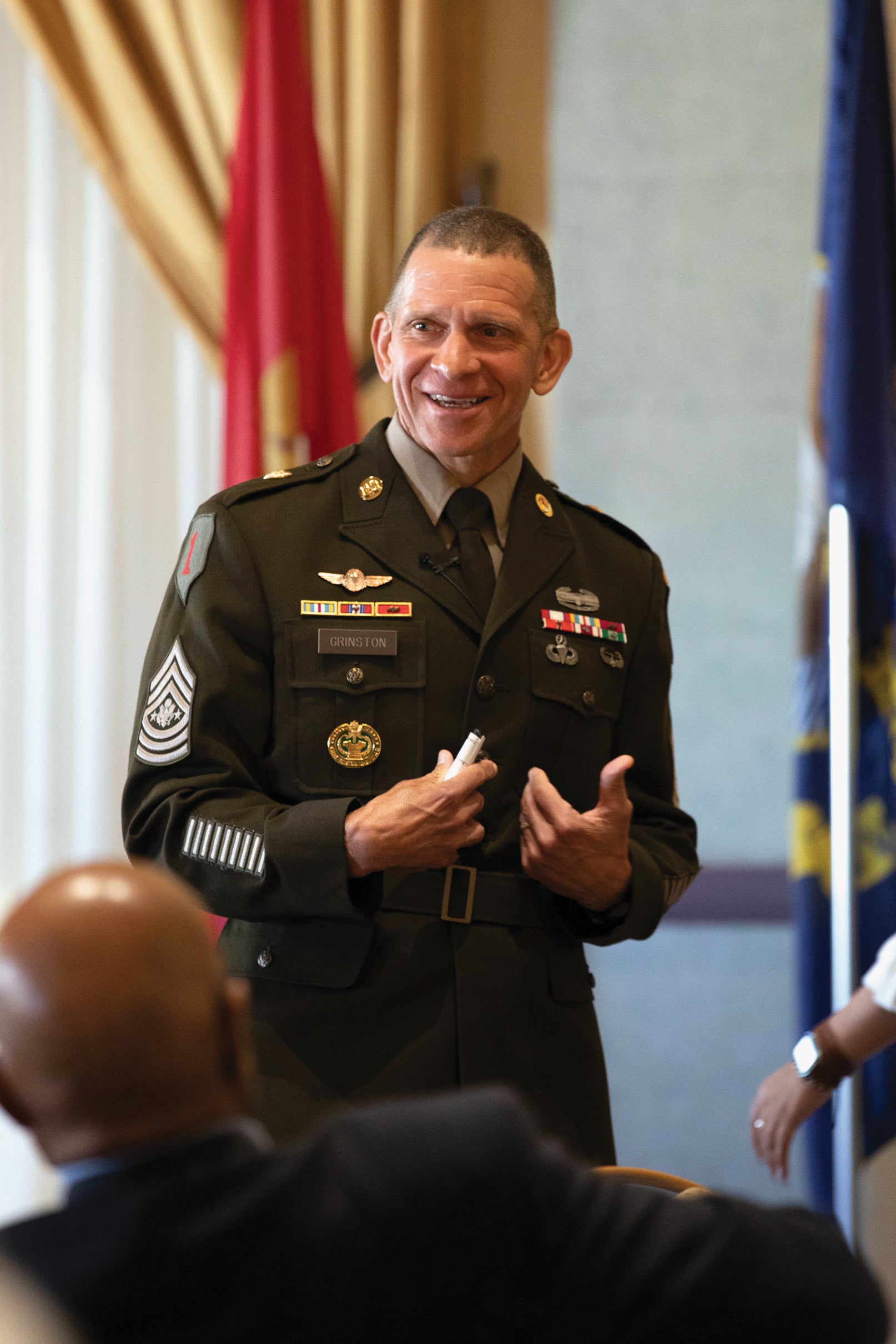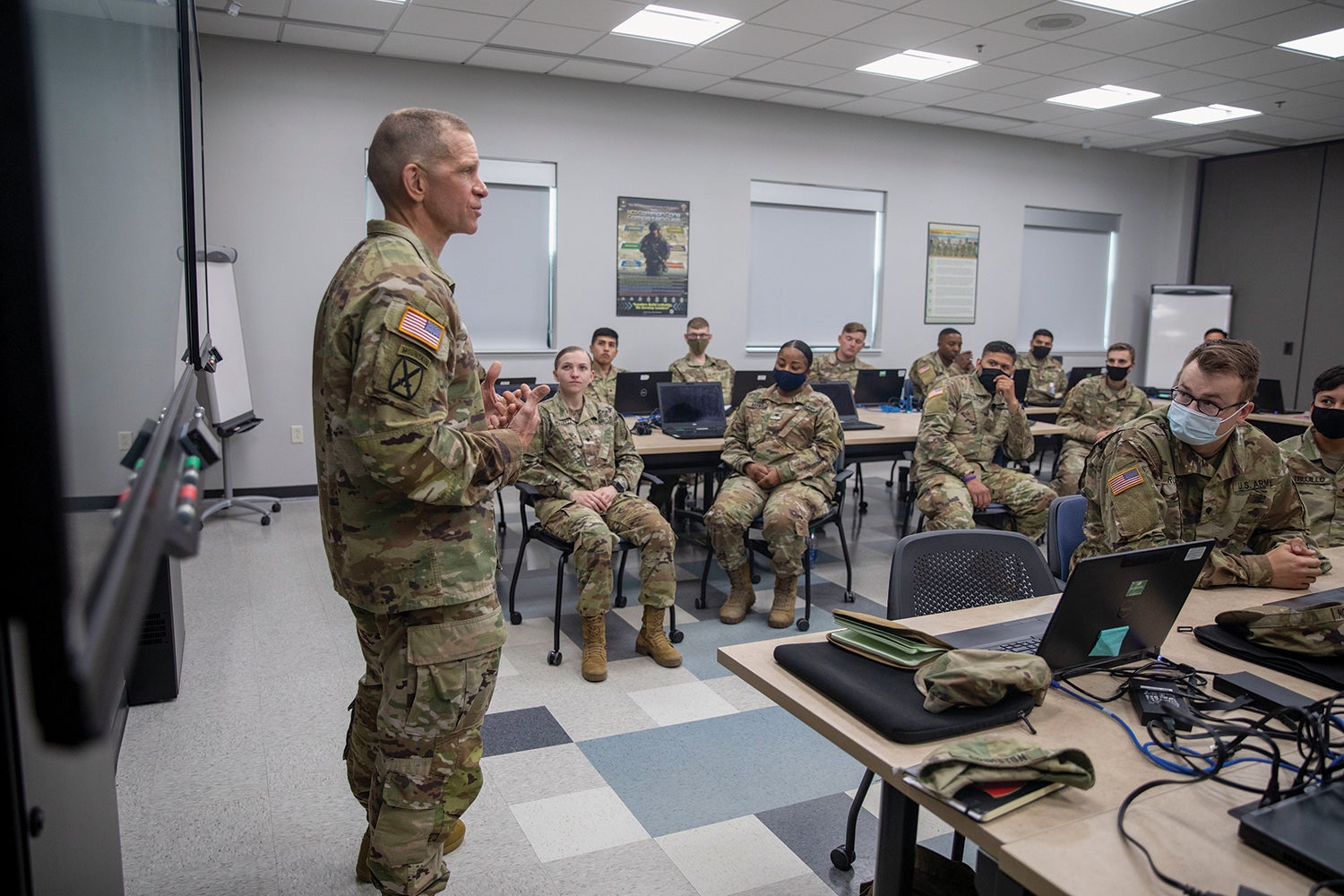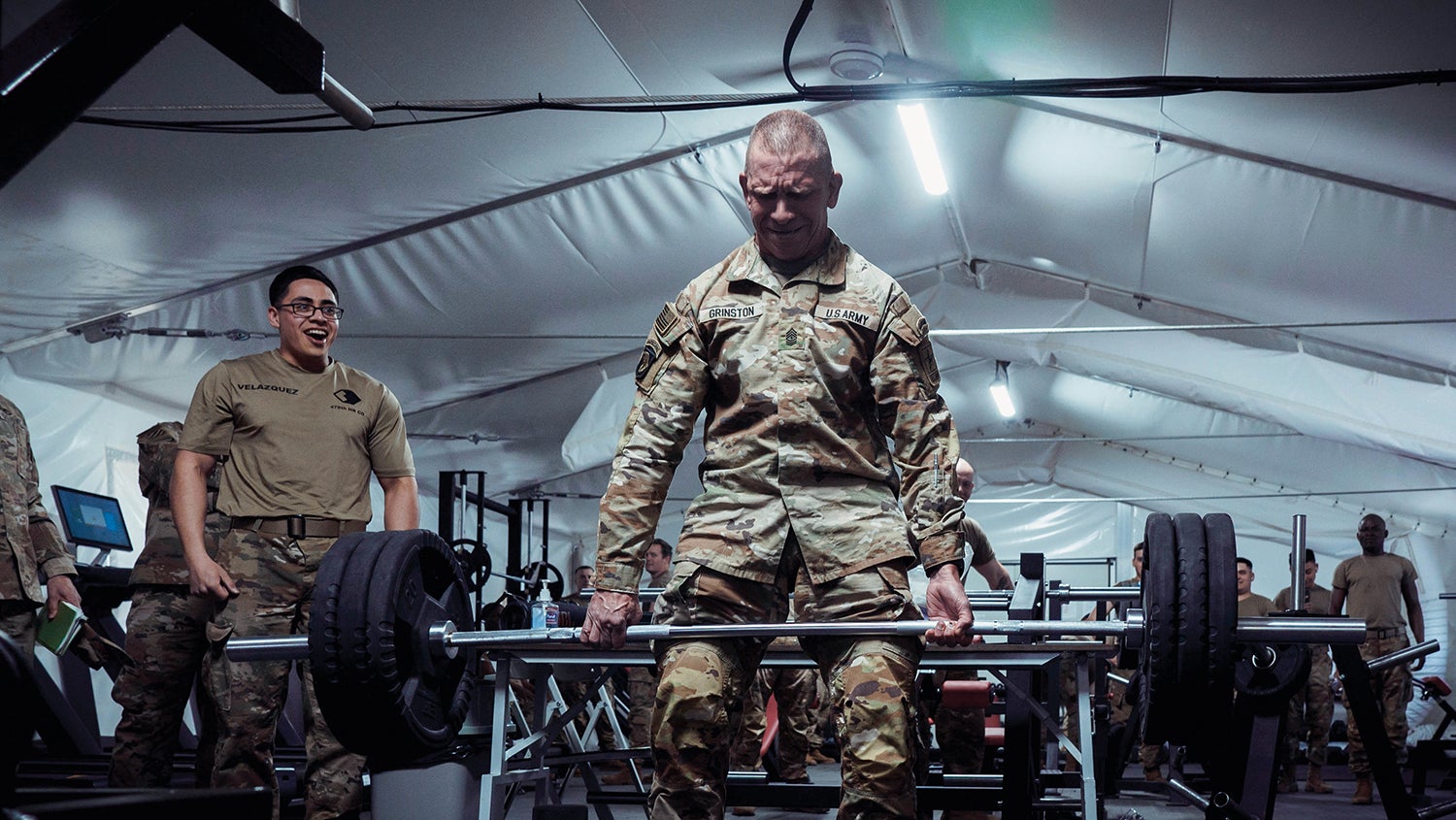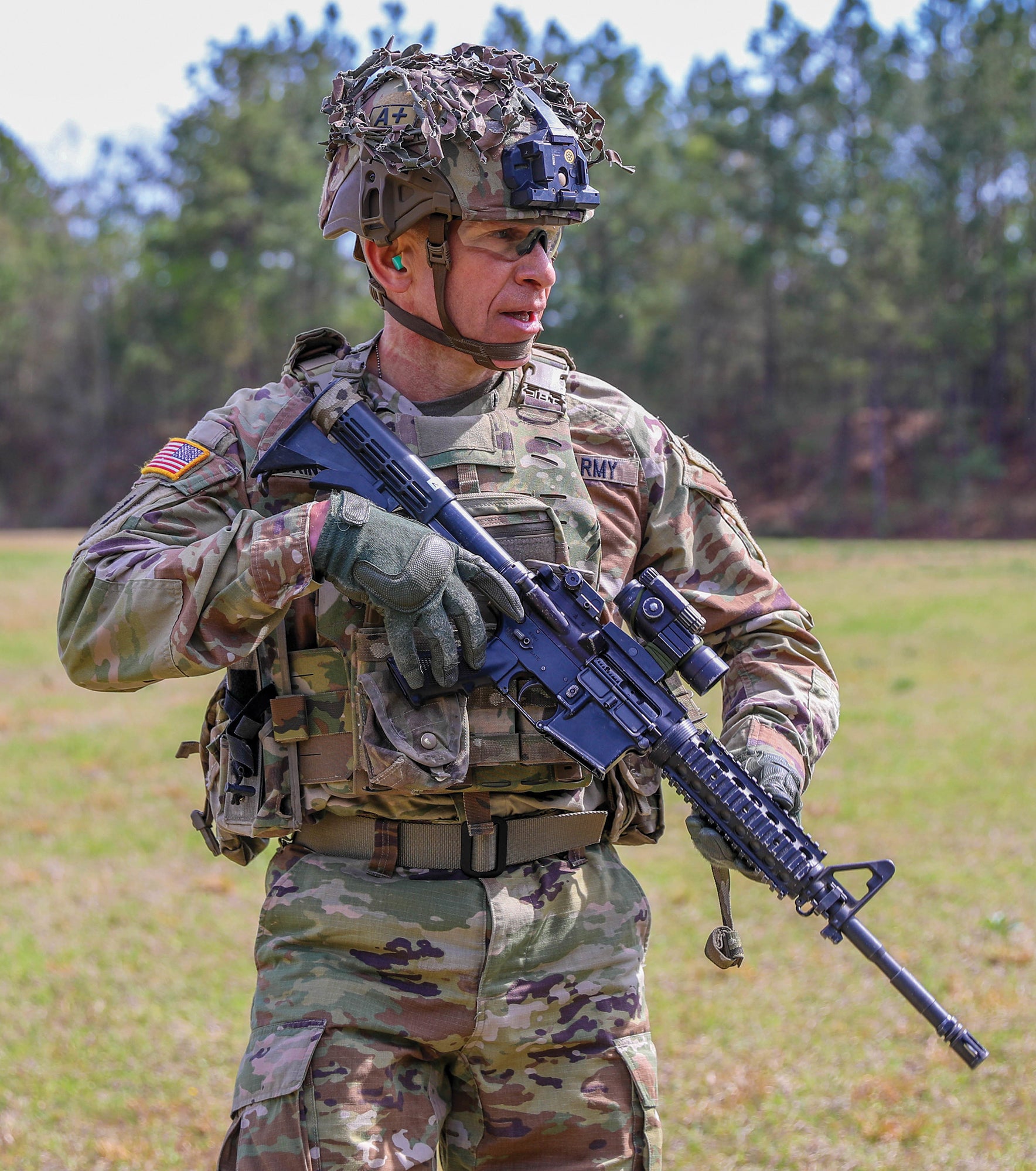Facing a recruiting crunch and unrelenting demands on the force, Sgt. Maj. of the Army Michael Grinston is concerned about taking care of soldiers and their families.
Now in his fourth year as the Army’s senior enlisted adviser, Grinston continues, as he has throughout his tenure, to concentrate on building stronger, more cohesive teams. He also remains immersed in efforts to improve quality-of-life programs for soldiers and their families, and emphasizes caring, commonsense leadership from teams and squads on up.
He has kept this course as the Army responded to a devastating pandemic, crises in Europe and the Middle East, the fraught withdrawal from Afghanistan, civil unrest across the U.S. and natural disasters, all while training and preparing for the nation’s next call.
“We have a lot of requirements for our Army. That is the stress that I worry about,” Grinston said, expressing concern that the smaller force resulting from recruiting challenges could make things tougher for soldiers. “I don’t see a whole bunch of things coming off the plate,” he said, noting there are still soldiers in Iraq and Syria. Thousands more are in Europe and Korea, while others respond to forest fires, hurricanes and COVID-19.

“I think that’s what is putting more stress on our soldiers, is that when we don’t assess enough soldiers coming in, and the requirements or the demand for our soldiers isn’t less. That’s the stress on soldiers and their families,” Grinston said. He added that he hears “I need more people” wherever he goes.
“We have to have good quality of life. We have to put effort into our barracks, our housing, our health care, our child care, spouse employment,” he said. “The soldiers we have, we’ve got to take care of, because they’re under a huge strain.”
Challenging Times
The Army’s No. 1 resource is its people, Grinston said. Many now serving have only known an Army at war, serving back-to-back deployments to Iraq or Afghanistan. Others are new to the force, and many are regularly tapped to serve rotations to Europe, Korea and Kuwait. There are also soldiers who are wounded, ill or injured, those who are moving duty stations, those who are retiring and those attending professional military education courses, and it adds up to a busy Army with not a lot of breathing room, Grinston said.
The requirements “put a huge demand on the Army, and it just hasn’t let up at all,” Grinston said. Even after last fall’s withdrawal from Afghanistan, “we immediately send probably more troops than we had in Afghanistan, we send more than that to Europe, and they’re still there.”
Army leaders acknowledge that there is no quick or simple fix to the service’s recruiting challenges—caused by a combination of factors, including a low propensity to serve and a shrinking pool of qualified candidates. They also do not expect a substantial decline in the many missions and requirements demanded of the Army as it simultaneously works on its most ambitious modernization and transformation effort in four decades.
Grinston hears about the grind from soldiers and families during regular troop visits to posts across the country. “When I talk to families and soldiers, it’s ‘I just got back from Korea, now I’m going over to Europe, now I’m coming back, and I’m going to do this next mission,’ ” Grinston said. “My perception is they just know, ‘I’m doing these missions. How do I get off this merry-go-round?’”
Relief Efforts
For Grinston, the key is leadership, and leaders must be mindful of their soldiers and the stress the troops may be under.
It’s easy, Grinston said, to rely heavily on strong performers, putting them up for new or different assignments or calling on them for extra tasks or duties. “When you get somebody like that, you’ve got to make sure they have balance, and I think leaders have to control that,” Grinston said.
The Army can help with some policies. He cited as an example a directive, issued in April, on parenthood, pregnancy and postpartum policies that aims to ensure soldiers can progress in their careers while growing their families.
Army Directive 2022-06: Parenthood, Pregnancy and Postpartum modifies six existing policies, including extending exemptions for postpartum body composition and physical fitness testing, and increasing family care plan flexibility. It also introduces six new policies, including policies related to professional military education, fertility treatment and pregnancy loss.
“You’ve got great men and women soldiers that are single parents, and they’re really good soldiers, [and] we have to have some balance in their lives,” Grinston said. “We can’t keep leaning on them without getting some resiliency, some time to reset.”
But the Army cannot write a policy for “every scenario in the world,” Grinston said as he emphasized the importance of engaged and thoughtful leadership. “We can have a great policy, but without leaders knowing it or enforcing it, or just taking some action, it’s just a piece of paper,” he said. “Bottom line is, even if there is no policy, or it’s contradictory to a policy we have now, we have to put some common sense in how we manage our people.”

Familiarity, Teamwork
Grinston believes his message, which he has espoused since becoming sergeant major of the Army in August 2019, is permeating the force, particularly his work on the This is My Squad initiative, which aims to build strong, cohesive teams and encourage leaders to get to know their soldiers.
This is My Squad is now part of a forum in the Basic Leader Course, which is a requirement for soldiers preparing for promotion to sergeant. At the senior NCO level, Grinston and other senior enlisted leaders continue to mentor their fellow NCOs on the importance of leadership and building strong teams, and Grinston discusses these topics with nominative sergeants major during annual forums.
He also advocates for what he calls “leadership by walking around.” Being present, showing up and talking to soldiers—those actions have value, Grinston said, and it is something he’s done for much of his career.
“That’s been the way I’ve done stuff; I just don’t get to walk around as much by myself anymore,” he said. “That’s what I miss about not being physically on a post.”
The challenge lies in what Grinston called the “frozen middle”—soldiers who have been around for a while, who have deployed to combat and who may not immediately embrace initiatives such as This is My Squad.
To tackle that population, the Army is launching an initiative Grinston called targeted counseling, where battalion sergeants major will receive counseling from their division command sergeant major, Grinston said.
“I want it to be positive,” Grinston said, and the goal is to help that NCO find ways to get to know soldiers in their formations. It could include discussions on how best to sponsor newcomers and how to conduct leader development and engagement more effectively.
“It’s not a gotcha, but what can I do to help you … to get to this culture of, it’s OK to know your people, it’s OK to share that you’re having issues, and we can get you the help that you need,” Grinston said.

Value in Mentorship
He also wants to increase mentorship across the force. “I think that’s still the secret sauce we’re missing to get after some of those other things, like really getting down to zero with suicide and sexual assault,” he said. “With mentorship, you’ll get less and less of that.”
Another challenge is improving the alcohol culture in the ranks, Grinston said. Excessive drinking can lead to mishandling a gun or to sexual assault or domestic violence, he said. “How do we get to a culture [where we] not do away with alcohol, but if I have a better culture where I don’t drink in excess, I get that downstream effect on those other things,” Grinston said.
Ultimately, Grinston said, he is looking to play the long game, especially when it comes to taking care of soldiers. “Remember to treat our soldiers respectfully,” he said. “Don’t overuse them. If you’re injured, go see Holistic Health and Fitness, go to the physical therapist, get that MRI, because the long game is I need them to recover properly and then come back. Don’t go, ‘Well, just suck it up.’ We’ve probably heard that 1,000 times in the Army.”
If you take care of soldiers, they’ll stay and continue to contribute and be productive, Grinston said.
They can also be the Army’s best ambassadors.

Positive Message
As the service struggles with recruiting, Grinston wants soldiers to tell their stories.
“Talk to somebody that’s never met somebody in the military,” he said. “I still think there are these urban legend stories about what the Army is, over what it isn’t. We have great soldiers. You just have to get to know them.”
The Army boasts enlisted soldiers with doctorate degrees, who are Harvard University-trained lawyers or graduates of the Massachusetts Institute of Technology, and so much more, Grinston said. “They just need to go out and say, ‘Here’s what I do, here’s my job,’ ” he said.
Not every soldier story is going to be positive, but Grinston said that’s OK, too.
“There may be some bad … but contrary to what you read in the paper, most soldiers, when I talk to them about the Army, they do have positive things to say,” he said. “I’m confident that there would be more positive than there would be negative. I have faith in our soldiers.”
Ultimately, Grinston said he strives to make a difference—for the Army and in soldiers’ lives. “What I’m concerned about is I’m doing what’s right for the Army every day,” he said. “Just head down, work hard. That’s all I care about.”

